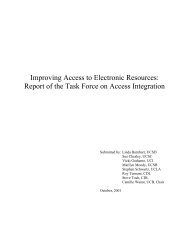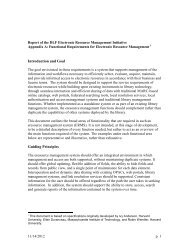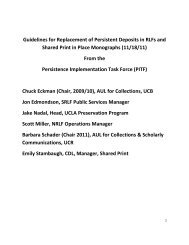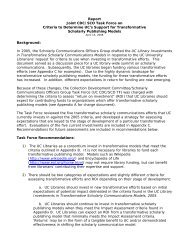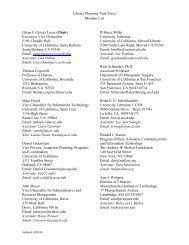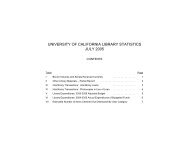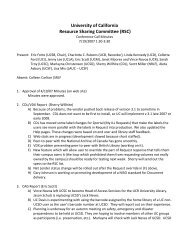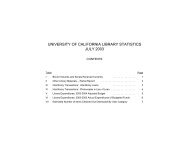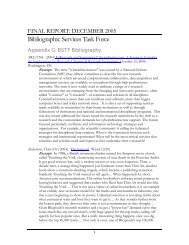The University of California Libraries: A Plan for Development (1977)
The University of California Libraries: A Plan for Development (1977)
The University of California Libraries: A Plan for Development (1977)
Create successful ePaper yourself
Turn your PDF publications into a flip-book with our unique Google optimized e-Paper software.
VII. In<strong>for</strong>mation and Instruction 103<br />
Referral Services. <strong>The</strong> need <strong>for</strong> in<strong>for</strong>mation affects other agencies<br />
that disseminate in<strong>for</strong>mation as well as libraries, <strong>of</strong> course, and recently<br />
there has been a growing concern that too little has been done<br />
to link these agencies and their services together <strong>for</strong> the benefit <strong>of</strong><br />
the citizenry. This realization has led to a new interest in, and<br />
emphasis on, the referral function <strong>of</strong> libraries, i.e., the linking <strong>of</strong><br />
needs with services, wherever they may be located. <strong>The</strong> appropriate<br />
service may or may not be the library; one article on "in<strong>for</strong>mation and<br />
referral service" (to use the current term) even suggests that "it may<br />
be necessary to phone an agency to make an appointment <strong>for</strong> a patron who<br />
is not able or com<strong>for</strong>table in doing that <strong>for</strong> himself." 1 When the pro-<br />
cess leads to another agency, it may also be necessary to follow up to<br />
insure that the link was made and the problem resolved. "Some patrons<br />
quite literally need an interpreter to deal with agencies, because <strong>of</strong><br />
language difficulties or because they do not communicate well on the<br />
telephone," and follow-up may be necessary simply "because they have<br />
been given the runaround by another agency (or think that they have)." 2<br />
<strong>University</strong> libraries have become increasingly aware <strong>of</strong> the importance<br />
<strong>of</strong> their role in this regard, both because <strong>of</strong> a realization that<br />
their unique resources and expertise may be <strong>of</strong> help, and also because<br />
<strong>of</strong> a more pragmatic realization that financial support depends on public<br />
awareness <strong>of</strong> the value <strong>of</strong> libraries.<br />
<strong>The</strong> library at UC San Diego recently participated in a study in<br />
the San Diego region which indicated both the need <strong>for</strong> libraries to<br />
be involved in the referral process, and the fact that libraries are<br />
too <strong>of</strong>ten overlooked as sources <strong>of</strong> help. A report on the study (written<br />
by the Associate <strong>University</strong> Librarian at UC San Diego) indicated<br />
that<br />
even though libraries do occasionally refer questions to<br />
in<strong>for</strong>mation agencies, their tendency is to try to bend questions<br />
so that they can be answered by printed materials even<br />
though other kinds <strong>of</strong> referrals would be more appropriate.<br />
In<strong>for</strong>mation agencies, on the other hand, seldom refer to<br />
1 Robert Croneberger, Jr., and Carolyn Luck, "Defining In<strong>for</strong>mation and<br />
Referral Service," Library Journal, v. 100 (November 1, 1975), p. 1986.<br />
2 Ibid., p. 1987.



